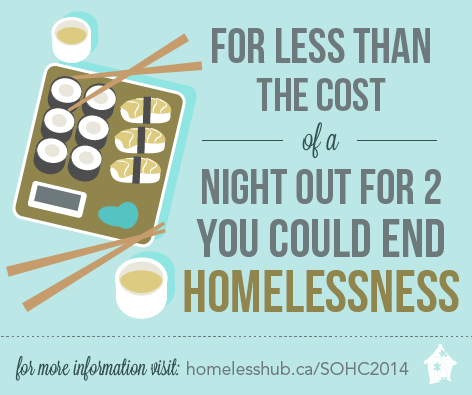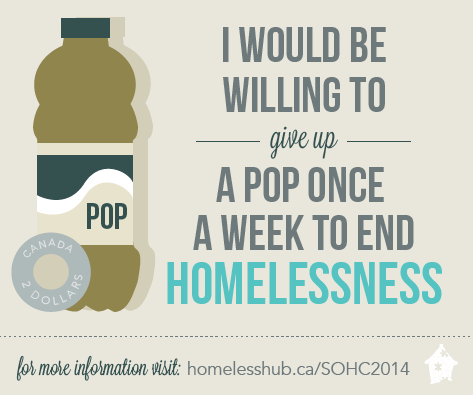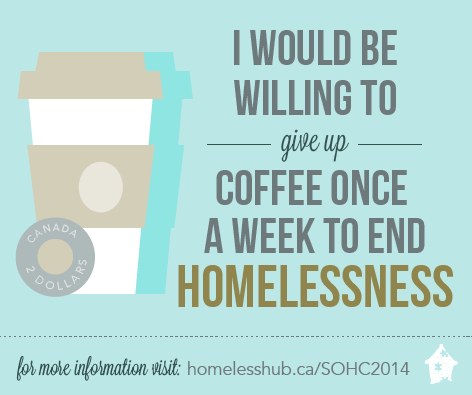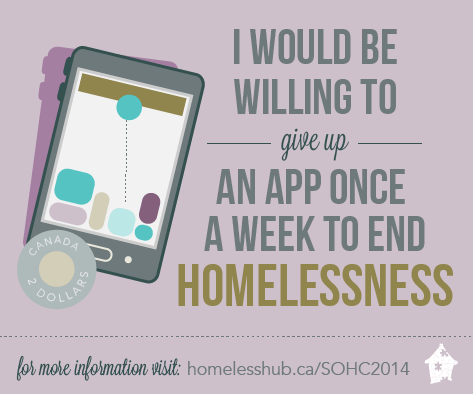Last year we came across an infographic about the cost to end homelessness in the United States based on a New York Times report from 2012. We wondered whether we could do something similar for Canada. We couldn’t because we didn’t have the numbers until this week when the State of Homelessness in Canada: 2014 was published. Based on work from real estate scholar Jane Londerville and economist Marion Steele, and published by the Canadian Observatory on Homelessness/Homeless Hub in conjunction with the Canadian Alliance to End Homelessness this report costs out a solid path towards ending homelessness at $3.752 billion in 2015/2016 and about $44 billion over ten years.
This seems like a lot but it’s not actually that much. Mark Johnston from Housing and Urban Development (HUD) “estimated that homelessness could be effectively eradicated in the United States at an annual cost of about $20 billion”. Our annual cost of around $4 billion seems small in comparison. After all, Disney paid that amount to buy Lucasfilm back in 2012 and they got Star Wars in the deal!
Our plan works out to about $106/Canadian annually, $2.04 cents weekly, just 88 cents a week more than current spending. For that small amount we can contribute to a realistic solution to homelessness and the affordable housing crisis.
We're asking the federal government to use their anticipated surplus and otherwise dedicate tax dollars towards the recommendations in our report. Tax dollars come out of your pocket though. So what does that really look like at a personal, practical level?
Many working people and working families eat out on a regular basis. Even a $10 lunch once per week will cost $520/year. A Canadian Eh! Large pizza from Pizza Pizza in Westminster B.C. is about $20 including tax and delivery. Do that once a month and it will cost you $240 a year. A Big Mac meal at most McDonald's would cost $8. Buy two a month and it will run you $192/year.
What about some other seemingly trivial expenses? A pack of gum per week adds up to about $70/year. Purchasing two top Canadian magazines will cost about $375/year: buying The Walrus at the newsstand would cost $69.50/year whereas weekly magazine Macleans would cost $305.80. Subscriptions would still ring in at $84/year. Even grabbing that quick snack or pop at the vending machines adds up. Chips and a drink would add up to $208 if you bought them every week. I’m a complete diet coke addict but I’d be willing to give up a pop (or even two) every week if it meant ending homelessness.
Social media can be another big money suck. Are you or your kids addicted to Candy Crush or interested in purchasing another app for your iPhone or iPad? Even at $2/app that’s $104 a year. Add in music from iTunes, a Netflix subscription and a few Facebook gifts and it quickly adds up.
What about your double-double fix? Tim Hortons, Canada’s favourite coffee purveyor, serves 2 billion cups of coffee per year. Your daily coffee fix will run you over $500, even if you skip the weekends.
Would you give up a coffee or two if it meant contributing towards ending homelessness?
Even caring for our pets costs us some big bucks. The average annual cost of dog ownership in Canada is $1,071, a cat is $835, a hamster $225 and a rabbit $450.
Annual purchases can also get expensive. Halloween costumes are commonly in the $50-100+ range, especially if you want a trendy one with all of the accessories. Sure to be the rage tonight, dressing your young princess as Elsa from Frozen would cost $62.97 for the costume, wig, tiara, wand and shoes at Party City.
According to Statistics Canada the average Canadian household spends $7,739 on food annually. This includes $5,572 in stores and $2,167 at restaurants. This works out to $3,095.60/person – $2,228.80/person in stores and $866.80/person in restaurants.
Other Canadian expenditures (all indicated per person) include $1,384.40 for clothing, $1,493.20 for recreation, $80.80 on games of chance and $873.20 for household furnishings and equipment.
For many households, one of their biggest expenses is probably their car. The Canadian Automobile Association calculates the cost of driving different types of cars (compact, mid-size and cross-over) for different lengths of distance. Using the average of the three cars driven 18,000 kms annually, the average Canadian driver spend $10469.92/year. This works out to $872.49/month and $201.34/week. (At 24,000km – average annual cost is $11,704.08, monthly cost is $975.34 and weekly cost is $225.08.)
Money to end homelessness is just a drop in the bucket.
Share these images if you agree:
Tweet this: I would be willing to give up a pop once a week to end homelessness.
Tweet this: I would be willing to give up coffee once a week to end homelessness.
Tweet this: I would be willing to give up an app once a week to end homelessness.





